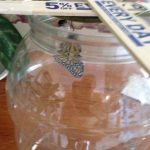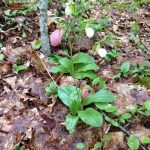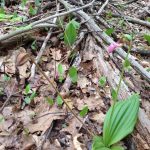Volunteer Spotlight: Muriel Allen
Volunteer Spotlight: Muriel Allen
“I started with Signs of the Seasons just last spring. [I] responded to an email I had received about a training session to be held at the Gilsland Farm Audubon location not far from where I live in Portland. Climate change is one of my biggest concerns and as soon as I realized this program would give me a way to help a little with that and provide a good excuse for spending more time outdoors I knew it was for me! The program has not only given me great information about the regional effects of climate change, it has also made me a much better observer of everything in nature especially the tiny things. Not to mention that it challenged me to install an new and very convenient app on my cell phone to download my data. I quickly realized that if I didn’t several trees would have to die just to provide my observation sheets. I am having so much fun that I can’t stop talking about it to everyone and have some new recruits for you if you are planning a session nearby next year.
I guess my favorite observations occurred right in my front garden where some milkweed planted itself a few years ago. I kept worrying that it was the wrong milkweed (having read about that) but I pretty well convinced myself otherwise this year. First by checking out photos and descriptive information that I received from you, then my catching a monarch laying eggs on the leaves one day and then conclusively by raising a tiny caterpillar I found on a leaf to save her from the aphid invasion. What’s a safe way to get rid of aphids and their ant herders? She (I looked up how the tell male from female) was born and released on September 2nd and it seemed that she continued to visit our yard for a few weeks after that!
- Monarch caterpillar.
- Monarch cocoon.
- Monarch butterfly
One of my favorite sites to visit was Woods Ledge, a veritable moccasin flower garden that I had known about and been praying over for years. Please don’t let anyone find this spot unless they know that they must not be picked. I knew it was an unusually prolific spot, in the best years producing close to 45 blooms. After the blossoms faded I discovered part of the answer to why. Although all the literature says that these plants are unusually difficult to pollinate there appeared to be at least ten fruits, unfortunately, not on my single plant! And I did not see who was doing the pollinating. Before next year I have vowed to designate both the milkweed and the moccasin flowers as patches rather than single plants. More rewarding to find that one of my own plants is reproducing and a good reason to be outside a little longer. Alas, I saw only one toad all year. Maybe I started too late in the spring?”
- Pink lady slipper (aka: moccasin flower).
- Pink lady slipper (aka: moccasin flower).





